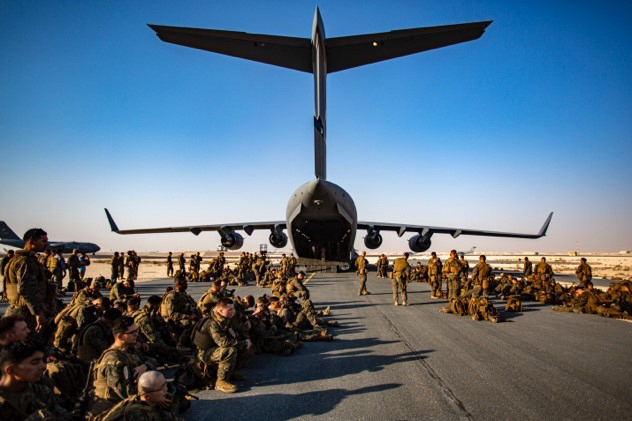
Evacuation at Hamid Karzai International Airport (CREDIT: Marine 1st Lt. Mark Andries)
WASHINGTON: “The world has witnessed how the US evacuated its diplomats by helicopter while Taliban soldiers crowded into the presidential palace in Kabul,” the official and hawkish Chinese English-language Global Times editorial page wrote within hours of the Taliban taking the capital. “This has dealt a heavy blow to the credibility and reliability of the US.”
But is it that obvious? More importantly, is it true? And how will America’s allies, partners and adversaries judge the strategic implications?
A trio of Indo-Pacific analysts told Breaking Defense that any discussion of Chinese messaging needs to acknowledge the Chinese are fast and brilliant at shaping a clear and intriguing message. It’s no surprise the Global Times editorial went up in less than 24 hours after the Taliban entered Kabul.
“I think this is just exploiting weaknesses, and is classic propaganda,” Sarang Shidore, an expert on South Asia and the Pacific who is a non-resident fellow at the Quincy Institute, a DC-based think tank, said.
“I’d put this down to psychological warfare (one of China’s three types of warfare)” Meia Nouwens, an expert on the Chinese military at the Institute of International Strategy Studies, says in an email.
But intriguingly, Beijing’s rush to portray America as weak may be masking its deeper concerns about the fact America is apparently willing to actually follow through on threats to leave the Middle East and refocus elsewhere.
Beijing’s concern about the US withdrawal “has as much to do with potential regional instability in Central Asia as it does with the understanding that the US is posturing itself to prioritise the Indo-Pacific theatre, and counter China,” Nouwens said.
Shidore said he thinks the US withdrawal from Afghanistan, and the Biden Administration’s commitment to it, demonstrates to Pacific nations that the US really is serious about focusing on their region, what used to be called the Pacific pivot. “The US withdrawal from Afghanistan, planned and carried out by two very different presidents, is indicative that the United States is increasingly shifting its security focus to the Indo-Pacific, rather than adopting a strategy of restraint.”” he said, adding that allies and the Chinese know this. “I think they understand that the Pacific priority is one of the reasons why President Biden pulled out of Afghanistan.”
At the same time, while Shidore thinks allies and partners understand Afghanistan is not a central strategic issue for the US anymore, the incompetence demonstrated by the United States in staging its withdrawal can’t be fully ignored by other nations.
Dean Cheng, a top Chinese military analyst at the Heritage Foundation, believes the images from Kabul’s airport and the unexpected collapse of the Afghan government will embolden China to press harder in negotiations with the US on climate change, and to press other nations to accept Chinese 5G and other advanced technology into their communications systems.
“Beijing has just been handed an absolutely wonderful opportunity to basically say, ‘Yo, we thought the Americans were in decline, but everybody doubted us. They can’t even do a basic military operation against fairly backwards, less capable people like the Taliban,'” Cheng said. “And that’s part of the message that they are pounding away at toward Taiwan, South Korea, Japan, Thailand and India.”
India is the one country Shidore thinks will be truly worried about the Afghan collapse. India’s longtime rival Pakistan has nurtured the Taliban for decades (some argue Pakistan created the Taliban) and is positioning itself as a key interlocutor for the Taliban-led government. “The US,” he says, “will have to manage the Indian perceptions once the evacuations are finished.”
But it is Taiwan where China focused its earliest propaganda barrages. Look, Global Times argued:
How Washington abandoned the Kabul regime particularly shocked some in Asia, including the island of Taiwan. Taiwan is the region that relies on the protection of the US the most in Asia, and the island’s Democratic Progressive Party (DPP) authorities have made Taiwan go further and further down this abnormal path. The situation in Afghanistan suddenly saw a radical change after the country was abandoned by the US. And Washington just left despite the worsening situation in Kabul. Is this some kind of omen of Taiwan’s future fate?
Nouwens says it is “unsurprising that the Global Times used this opportunity to draw a false equivalence between the US’ commitment to Afghanistan and the US’ commitment to Taiwan.” And she argues that the Chinese are really more worried about the possible resurgence of terrorism in Afghanistan.
“Despite the Global Times leveraging the opportunity of the US’ withdrawal from Afghanistan to portray the US as an unreliable partner, I doubt Beijing isn’t concerned about the impact a US withdrawal will have on Chinese security and that of its neighboring countries,” Nouwens says in her email.
Shidore agrees, calling the Uighurs “the million dollar question” for China. After all, the Uighurs, whom China appears to view as an existential threat to their rule, live next door to Afghanistan.
The Chinese, who have not yet recognized the Taliban but have expressed support for the new regime, made clear their interest in curbing terrorism in a statement four days ago. China “respects the wishes and choices of the Afghan people,” said Chinese foreign ministry spokeswoman Hua Chunying. “China expects these statements to be implemented to ensure the situation in Afghanistan achieves a smooth transition, curbs all kinds of terrorist and criminal activities, and allows the Afghan people to be far away from war and to rebuild their beautiful homeland.”
So what will the future hold for the Chinese-Afghan relationship?
“Despite the talk of friendly ties, it will be interesting to see whether Chinese policies towards Muslim Uyghers in Xinjiang may cause friction between the two sides,” Nouwens says. “That friendly relationship may take the form of economic support and investment towards the reconstruction of Afghanistan, as was discussed in the meeting with Wang Yi last month. However, there will be a risk-benefit calculation for Beijing, which has already experienced attacks against Chinese nationals and projects in other unstable countries along the Belt and Road Initiative.”
From F-16s to NATO, Argentina’s moves tilt West, but ties to China to last
There are flashpoints to watch as Argentina navigates its future between the polar attractions of Washington and Beijing, including future defense deals and a deep space facility.


























